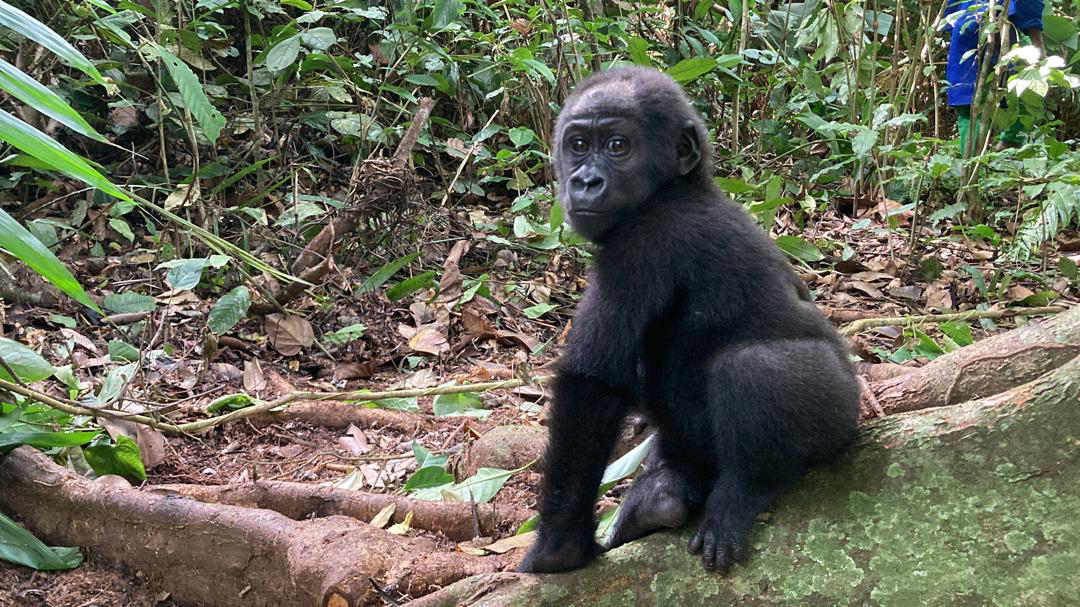AWF and MINFOF Rescue Endangered 11-Month-Old Gorilla in Cameroon’s Dja Reserve

11-month-old western lowland gorilla at Ape Action Center in Cameroon's Center Region.
Spanning over 5,260 square kilometers, the Dja Faunal Reserve in Cameroon is a critical biodiversity hotspot, home to critically endangered great apes, such as western lowland gorillas and chimpanzees. However, this vital ecosystem is under immense pressure from poaching and deforestation. The African Wildlife Foundation (AWF), in partnership with Cameroon’s Ministry of Forestry and Wildlife (MINFOF), is tackling these challenges through a holistic approach that combines biomonitoring, anti-poaching patrols, and community-centered conservation initiatives.
In August, AWF and MINFOF rescued an 11-month-old western lowland gorilla and transferred her to the Ape Action Africa Sanctuary in Cameroon’s Center Region. The infant, named Lomia, was found in the Lomie district, five kilometers from the Dja Faunal Reserve. Now at a sanctuary 400 kilometers away, Lomia joins 25 other rescued gorillas, receiving specialized care and protection.
Lomia’s rescue is part of a broader effort by AWF and MINFOF to protect endangered species in the Dja Reserve. In 2019, a 10-month-old chimpanzee was also rescued and transferred to the Sanaga-Yong Chimpanzee Rescue in Mbargue Forest.
“Infant gorillas like Lomia are often targeted by poachers,” said Endezemou Bertrand, conservator at the Dja Faunal Reserve. “Poachers kill the adults and capture the infants, keeping them in cages or smuggling them overseas as pets.”
The Ongoing Threat of Poaching and Deforestation
The Dja Faunal Reserve, a UNESCO World Heritage Site in the Congo Basin, is one of Africa’s most biodiverse regions. However, increasing human activity, including expanding settlements and infrastructure development, is driving extensive deforestation, fragmenting habitats, and threatening wildlife. Species like western lowland gorillas, chimpanzees, and African forest elephants are particularly vulnerable, heavily targeted by poachers for bushmeat and the illegal wildlife trade.
To combat these threats, AWF has partnered with MINFOF to equip rangers with advanced tools like CyberTracker and SMART (Spatial Monitoring and Reporting Tool). These technologies have significantly improved law enforcement’s ability to monitor wildlife and track poaching activities, making them essential for safeguarding the reserve. Over the past two years, AWF’s anti-poaching efforts have led to a 50% reduction in hunting within the reserve, providing much-needed relief to the area’s endangered species.
Engaging Communities for Sustainable Conservation
At the heart of AWF’s strategy is the belief that conservation and community development must go hand in hand. Many local communities living in and around the Dja Reserve have historically relied on bushmeat for food and income, making it essential to offer sustainable alternatives. AWF is working with these communities to promote alternative sources of income, such as sustainable agriculture, fish farming, and the harvesting of non-timber forest products.
“For generations, poaching has been a lifeline for these communities,” said Lesly Akenji, AWF Dja Landscape Manager. “But we are now witnessing a transformative shift toward conservation as we work with locals to create sustainable alternatives. We use a rights-based conservation approach, ensuring that all initiatives respect local populations’ rights and dignity.”
One of the most impactful aspects of AWF’s work is changing community perceptions of conservation. By offering tangible incentives, such as improved agricultural techniques and the development of alternative income sources, AWF is reducing local reliance on bushmeat and helping communities see the value of preserving their natural environment.
“Our awareness campaigns help communities understand the importance of preserving forest resources,” said Norbert Sonne, AWF Cameroon Country Director. “We’ve introduced sustainable practices like agroforestry and non-timber product use, which not only improve nutrition but also generate income.”
Lomia’s rescue highlights how AWF’s efforts are making a tangible difference in the fight to protect endangered species in the Dja Faunal Reserve. The combination of advanced anti-poaching strategies, community-led conservation initiatives, and strong partnerships is creating a powerful framework for conservation success.
>>Read more about AWF's work with Indigenous communities in Cameroon.